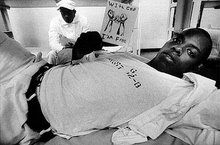

 At the American Society of Clinical Oncology's Breast Cancer Symposium held in San Francisco recently, researchers from the University of Rochester Medical Center made an announcement that at first glance may seem startling -- at least it may startle people who are unaware of the preventive and healing power of nutrients. When they studied 166 women undergoing treatment for breast cancer, the scientists found the vast majority, about 70 percent, had something other than their cancer in common: they had very low levels of vitamin D in their blood. What's more, women whose disease had progressed to late-stage (i.e. terminal) cancer had the lowest levels of all.
At the American Society of Clinical Oncology's Breast Cancer Symposium held in San Francisco recently, researchers from the University of Rochester Medical Center made an announcement that at first glance may seem startling -- at least it may startle people who are unaware of the preventive and healing power of nutrients. When they studied 166 women undergoing treatment for breast cancer, the scientists found the vast majority, about 70 percent, had something other than their cancer in common: they had very low levels of vitamin D in their blood. What's more, women whose disease had progressed to late-stage (i.e. terminal) cancer had the lowest levels of all.In this study, Joan Lappe PhD, RN and colleagues looked prospectively at more than 400 postmenopausal women over a four-year period of time. In one group the women were given 1100 IU of vitamin D and 1000 mg of calcium daily. The control group did not receive this. The results of the study were that the women who took the vitamin D and calcium over the ensuing four years reduced their rate of cancer by an amazing 60%. In fact the authors looked in more detail and found that for every 10 ng/ml increase in a woman's vitamin D blood level, the relative risk of cancer dropped by 35%. These data were not limited to breast cancer but included all cancers.
















































































































3 comments:
where is dmg plantation nigga md to talk bad about this
First off, who the fuck are you? Second, I'd love to see the article. If normalizing Vitamin D levels can reduce the rate of cancer, I'm for it. This doesn't mean all you need to do to avoid cancer is take vitamin D. The disease process is complex.
Correction she is not a scientist but a prossor of medicine kinda like DMG.. Go figure
Dr. Lappe is the Criss/Beirne Professor of Nursing and Professor of Medicine at Creighton University where she is a member of the research team in the Creighton Osteoporosis Research Center.
Post a Comment